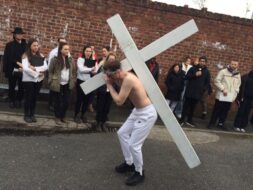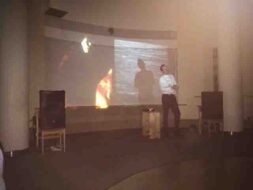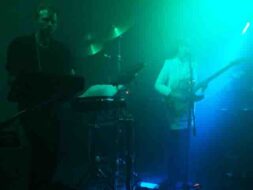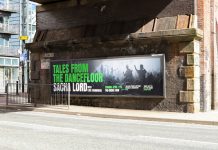At the White Hotel a tracksuit Christ drags a white prop cross down culture’s own Via Dolorossa. Thorn-crowned and stripped-to-the-waist he drags it, beam and transom borne on his back, before the paying crowd slip inside the House. What is it we seek? Sacrilege, or to be Saved? In the ensuing performance, amid the dust and darkness of that old Cheetham Hill auto garage, the Kantos Choir ring the air with Mass and a living room Lesson is given by Rough Trade author Roy.
“Culture,” a man once wrote, “is the meaning in an insufficiently meaningful world.” So as we contemplate the state of clubbing, Manc-wise, in light of our sorry separation from the Church, it may come as little surprise to see Passion Sunday celebrated at Salford’s own surreptitious hedonistic temple.
It’s God we are all working our way back to, after all.
Perhaps the bohemian boys and girls who make their fun in that place are still chasing the thrill of some chemical communion they experienced and figured actual religion might plausibly hit the spot. 
Or perhaps distant memories of suburbias long fled hold the embers of beliefs now vanished but secretly longed-for.
Whichever, as the plagal harmonies of Byrd’s Mass For Five Voices are dissonantly answered in the choral responses of Roxanna Panufnik and Charlotte Bray, harmony has never seemed so precipitously alive.
With Easter ahead, and war in the East, and despair in the air, the artist seeking succour fixes in the mind.
Shipping Forecast
At the Cross Street Chapel Gareth Smith wrestles gravely with his politics. Last year, under the Vanishing moniker, the Yorkshireman released an album titled 55ºN, 5ºE, a mixed music-and-spoken-word meditation on the Dogger Bank Incident of 1904, when in the midst of the Russo-Japanese War the Baltic fleet mistook a group of British trawlers for Japanese torpedo ships off the coast of Hull. The fishermen had their nets down when the Russians opened fire in the thick of the North Sea fog and so were powerless to evade the fusillade. One vessel was sunk and three fishermen lost their lives, among them Captain George Henry Smith of The Crane, Gareth’s great-grandfather.
“When there’s war it’s the working class who get killed,” Gareth told me in January – many weeks before last week’s live performance of his spoken word poem – noting to me then that  the Russian flotilla had itself been wiped out upon entering Japanese waters. As a political activist class analysis one of the ideas his performance piece draws on, though of course back in January few of us would have foreseen the carnage being wreaked by Russian guns in eastern Europe. “Be careful how you paint that point,” he tells me now, as we revisit the idea. “I wouldn’t want people to get the wrong impression about my views on the war.”
the Russian flotilla had itself been wiped out upon entering Japanese waters. As a political activist class analysis one of the ideas his performance piece draws on, though of course back in January few of us would have foreseen the carnage being wreaked by Russian guns in eastern Europe. “Be careful how you paint that point,” he tells me now, as we revisit the idea. “I wouldn’t want people to get the wrong impression about my views on the war.”
“East, North East, forever East, forever North East, forever the sea, forever the North Sea…” As he slow-speaks his monologue before a Super 8 diptych of fire and water the successive clauses of his speech spill over each other like waves reaching up a sodden shore. If the words are lead-weighted the drone of his voice – familiarly a shop steward fortissimo Hull brogue – becomes the music of the piece, and thus its meaning. “It’s a way of continuing the conversation with my dad,” he’d told me, of the legacies passed down across generations of father-son relations. Gareth’s dad may be twenty years dead but in the timbre of his vocal chords resides a memory reaching back generation upon generation.
Former Things
Then a data-glitch double exposure in the brain, and my belated first experience of Lonelady, aka Julie Campbell, back here at the White Hotel three nights ago. Now here is someone who looks like they get up at 3 o clock in the morning to pray. What Lonelady seeks in her heart is to unbuild Manchester, making records that sound like the ones they used to play in the Hacienda, presumably, in the days when nobody really went to the Hacienda. There’s something quite awe-inducing about her nervy retro synth-pop in the way each and every sound seems to have been curated to within an inch of its life in what can sometimes seem a mind-jacking assemblage of sonic references. You stand supplicant and think: “Isn’t that the bass sound from Transmission? Isn’t that the snare from Blue Monday? And JESUS CHRIST THAT’S THE ARPEGGIATOR FROM A POINTER SISTERS RECORD WHAT THE HELL WAS IT CALLED??” You could quite easily go completely insane.
The thing is that on one level you think to yourself: she should be massive. The attention to detail…the determination to do it all as live as possible…is almost unhinged. Everything from the clip on her Telecaster to the pallor on her cheek seems not merely authentic but devoutly proffered.
But sales and attendances are well below the potential of an urban prophet on the crest of her third album, which is why only a hundred and fifty or so souls are holed up at The White Hotel to see her.
With a busy electric drummer by her side and the tricky guitar figures she gives herself to play Campbell herself can seem a little bit stage-rear. Flame-haired and in psychiatric white she cuts an appropriately ill-at-ease figure but we seldom get the chance to feel for her predicament – the best being when she puts the guitar aside for the slow-burning Flee. Grey  words, grooveless bass and a shortage of melodic aspiration seem to tether the material to the ground. The neurotic gestures swallow the sentiment. You don’t move your feet or break your heart nearly as much as you want to. As an 80s deconstruction there are about as many bangers tonight as can be found in the opening titles to Grange Hill.
words, grooveless bass and a shortage of melodic aspiration seem to tether the material to the ground. The neurotic gestures swallow the sentiment. You don’t move your feet or break your heart nearly as much as you want to. As an 80s deconstruction there are about as many bangers tonight as can be found in the opening titles to Grange Hill.
This sack of quibbles is appropriate only because Campbell is such a unique proposition. Clearly, she’s the real deal, who if she were ever to leave the music business would surely shrivel to an intensely serious wisp and float away. If she sticks around long enough, though…surely she could end up huge? Tonight, lift-off of sorts is achieved in the form of Hinterland, title track of the second album. Loosed from the awkward rendition thereon it becomes the kind of swaggering floor-filler that could be the making of her. Torched with her acetylene funk guitar – and she is such a fine player to listen to – it slays the room. If everything else has been spectacle, this at least is communion.
@dannyxmoran
.







